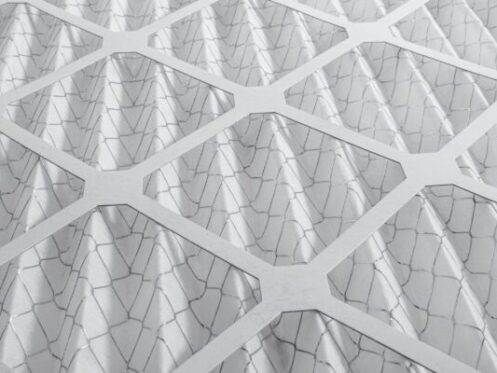How To Choose Between MERV vs. HEPA HVAC Filters
Surprisingly, your indoor air quality can be worse than the air outdoors. A critical factor in maintaining clean indoor air what type of air filter you’re using for your central heating and cooling system. HEPA and MERV filters are two commonly used types of filters. By increasing your knowledge about these filter types, you can make an informed purchase decision to enhance indoor air quality, improve energy efficiency, and ensure compatibility with your HVAC system.
What Are MERV-Rated Filters?
The Minimum Efficiency Reporting Value (MERV) is a system of rating air filters to determine their effectiveness in capturing small airborne particles. MERV ratings range from two to 20. The higher the rating, the smaller the particles the filter can capture. MERV-rated filters are commonly used in commercial, industrial, and residential environments.
These filters function by trapping contaminants within the filter, thus preventing them from circulating back into the indoor air. You’ll find different types of filters, such as fiberglass and pleated. Some types are more effective at trapping airborne particulates.
It is important to note that a higher MERV rating does not necessarily mean a filter is always suitable for a particular application. Filters with higher ratings have smaller pores, making it more difficult for air to pass through them. As a result, residential HVAC systems may not be designed to accommodate the increased air resistance caused by a high MERV-rated filter. Using the wrong filter could potentially harm the overall system.
What Do Different MERV Ratings Mean?
The MERV rating is determined by evaluating the filter’s ability to capture particles of a specific size. For residential filters, an ideal MERV rating falls between six and 13. This range effectively removes most airborne contaminants found in homes.
Filters with a MERV rating of six to eight are economical but provide minimal efficiency. Such filters are not recommended for households with asthma or allergy sufferers. Filters in this range are about 70 to 85% effective in capturing particles that measure between 3.0 and 10 µm. They are also not suitable for homes with pets as they are less efficient in removing pet dander.
Filters with a MERV rating between eight and 10 strike a balance between affordability and effectiveness. They efficiently capture most larger particles and up to 50% of smaller particles like mold, mildew, or pollen. These filters can be suitable for homes with allergy sufferers, particularly if purchasing higher-rated MERV filters is too costly. They capture around 85% of particles between 3.0 and 10 µm and between 50 and 80% of particles that measure between 1.0 and 3.0 µm.
Filters rated MERV 11 through 13 are great at capturing large and small particles. They are particularly effective for homes with pets. MERV 13 filters are regarded as the best filters for residential HVAC systems. They are also used in high-traffic areas such as schools to remove bacteria, smoke, and some viruses. These filters can eliminate between 60 to 90% of particles that measure between 1.0 and 3.0 µm and remove slightly less than 75% of particles that measure between 0.3 and 1.0 µm.
Filters with a MERV rating of 14 or higher do a great job capturing airborne particles. However, they are not typically used or recommended for residential HVAC systems. These filters are designed for heavy-duty filtration environments, such as medical facilities. Filters rated above 13 will restrict airflow and create resistance that most residential HVAC systems are not designed to handle. Using a filter with a MERV rating that is too high for your HVAC system can worsen your indoor air quality by placing too much stress on your HVAC system.
What Is a HEPA Filter?
HEPA stands for high-efficiency particulate air filters. These filters have the ability to remove up to 99.97% of various contaminants, such as pollen, bacteria, mold, and dust. HEPA filters can capture particles as small as 0.3 µm. However, when operating at peak efficiency, HEPA filters can capture smaller than 0.3 µm.
How Do HEPA Filters Work?
HEPA filters are distinct from the standard air filters commonly used in residential HVAC systems. They are thicker, pleated mechanical filters that are specifically designed to capture small particles.
The pleats in HEPA filters create a haphazard arrangement of fibers that are densely packed together. This structure allows the filter to capture particles of various sizes. HEPA filters use three mechanisms to trap airborne particles. They are diffusion, impaction, and interception.
The diffusion mechanism occurs when molecules smaller than 0.1 µm collide, delaying the time it takes for them to travel through the filter. This delay allows the other two mechanisms, interception and impaction, to capture the particles. Interception occurs when particles become trapped in the fibers as they pass through the filter, while impaction happens when larger particles become embedded in the fibers.
In order to increase the effectiveness of HEPA filters, a prefilter can be used in conjunction with them. The prefilter captures larger particles, allowing only the smallest particles to be trapped by the HEPA filter.
HEPA filters are not MERV rated. However, if they were, they would be considered somewhere between a MERV 17 and 20. This high filtration ability is why HEPA filters are the go-to choice for many hospitals. They can even trap viruses and bacteria. HEPA filters are often used for small air purifiers and on household appliances such as vacuum cleaners.
What to Consider When Selecting a Filter
A filter with a MERV rating of five to eight can effectively eliminate most allergens from the air. It is important to keep in mind that the air flowing through the HVAC system is cycled numerous times. Even with a filter rating in this range, your air quality will improve after a few cycles. A basic filter with a MERV rating of five to eight for homeowners with respiratory issues can be a cost-effective option.
If you are worried about volatile organic compounds (VOCs) that are commonly present in household cleaning products, you should choose a filter with a MERV rating of eight to 16. This is also true for households with smokers or homes in areas subject to wildfire smoke.
It is recommended to only use a HEPA filter if your HVAC system is compatible. Prior to installing a HEPA filter, seek guidance from the professionals at Trusted Heating and Cooling. We can evaluate your HVAC system’s capacity and suggest upgrades necessary to support HEPA filters.
Work With Trustworthy HVAC Specialists in Austin, Texas
Many HVAC companies make promises about their service. At Trusted Heating and Cooling, we deliver. Integrity and respect have been the core of what has made us one of the most trusted HVAC resources in Austin, TX. We have an A+ BBB rating, and our passion for our work and our clients is seen in the work that we have done for more than three generations in our community. Our NATE-certified team does the job well, and we strive to educate our customers on why we recommend the services and products we do.
Our services include HVAC installation, repair, maintenance, and tune-ups. We offer ductwork cleaning, repair, and replacement, heat pumps, mini splits, and smart thermostat installation. Contact Trusted Heating and Cooling today and see for yourself why we are a trusted name in heating and cooling.

